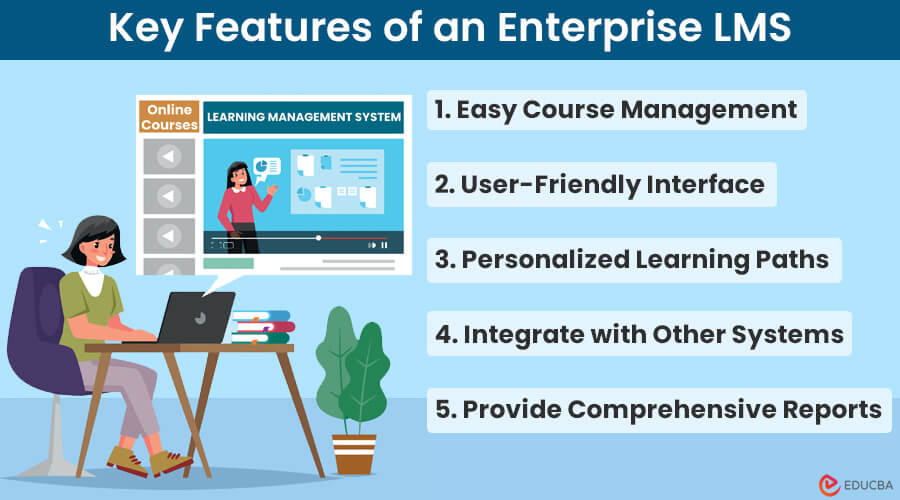What is Enterprise LMS?
Enterprise LMS (learning management systems) is a software platform that delivers and manages educational content and training programs for employees. Both small and large enterprises use these LMS systems to train their employees.
However, large enterprises face challenges when implementing LMS. Unlike smaller organizations, they need scalable and flexible solutions that can adapt to different learning needs according to various departments and locations globally.
Moreover, an effective LMS for large enterprises must deliver content efficiently, keep track of progress, evaluate performance, and integrate seamlessly with other company systems. This article explores the important features and considerations for selecting the best LMS suitable for large-scale operations. It helps to ensure that an organization’s learning and development efforts bring success and impact.
Scope and Scale of Enterprise LMS
The scope of a LMS for large enterprises is vast. Enterprise LMS generally supports thousands of users across different countries, each with different languages and learning preferences.
A good enterprise LMS should handle this level of complexity and also offer customization options based on the user’s needs. In addition to scope, scalability is also important. The system should upgrade with the organization’s growth without compromising performance or user experience.
Key Features of an Enterprise LMS
1. Easy Course Management
The LMS should offer courses suitable for different job roles and departments. It should make it easy to upload and update course materials, including multimedia content (documents, videos).
2. User-Friendly Interface
Since many employees from different departments will access the course, the LMS should be an easy-to-navigate interface requiring minimal training.
3. Personalized Learning Paths
Users should be able to customize their learning journeys based on their career goals and what skills they need.
4. Provide Comprehensive Reports and Analytics
For effective learning and development (L&D) strategies, the LMS should provide detailed analytics and reports on user progress, course completion rates, and skill development.
5. Integrate with Other Systems
The LMS must integrate seamlessly with other enterprise systems like HRMS (human resource management system), ERP (enterprise resource planning), and CRM (customer relationship management). It is necessary so that every operation works smoothly together.
6. Reach Locally and Globally
For multinational corporations, the LMS should support multiple languages and follow local regulations and standards.
Challenges in Implementing LMS for Large Enterprises
Implementing an LMS in a large enterprise is challenging. This is because LMS in large enterprises should provide data security and privacy features, especially when dealing with sensitive employee information.
Another significant challenge is managing and getting everyone to agree to the changes. Also, it requires support from all stakeholders.
One way to overcome this is through effective communication strategies to ensure smooth LMS system adoption. Moreover, enterprise LMS must be up-to-date with the latest learning technologies and methodologies for long-term success.
Best Practices for Implementing and Adopting an Enterprise LMS
The best practices for implementing and adopting an LMS in a large enterprise are as follows.
- Understand the specific learning requirements of the organization by conducting thorough research.
- Involve stakeholders from various departments in the selection process to pick the right enterprise LMS.
- Conduct a trial session of the selected LMS in a small group before implementing it on a full scale.
- Provide comprehensive training on how to use the system and support users when they need it.
- Regularly collect employee feedback and make necessary adjustments to the LMS.
Best LMS for Large Enterprises
Samelane is an ideal Learning Management System (LMS) for large enterprises. Its robust features provide diverse and scalable needs for big organizations. Some key features include a user-friendly interface, personalized learning paths, and great course management options.
In addition to this, Samelane also excels in analytics and detailed reporting, which offers deep insights into how training is going. It’s a comprehensive, flexible, and efficient LMS choice for large enterprises seeking to enhance their learning and development programs.
Final Thoughts
A good enterprise LMS can be a game-changer for large enterprises, enabling them to efficiently manage and scale their learning and development programs. By choosing an LMS that aligns with the organization’s needs, enterprises can create a dynamic learning environment that helps employee growth. Follow the best practices for implementation to make the organization successful.
Recommended Articles
We hope this article on “Enterprise LMS” was informative. To learn more, refer to the articles below.

